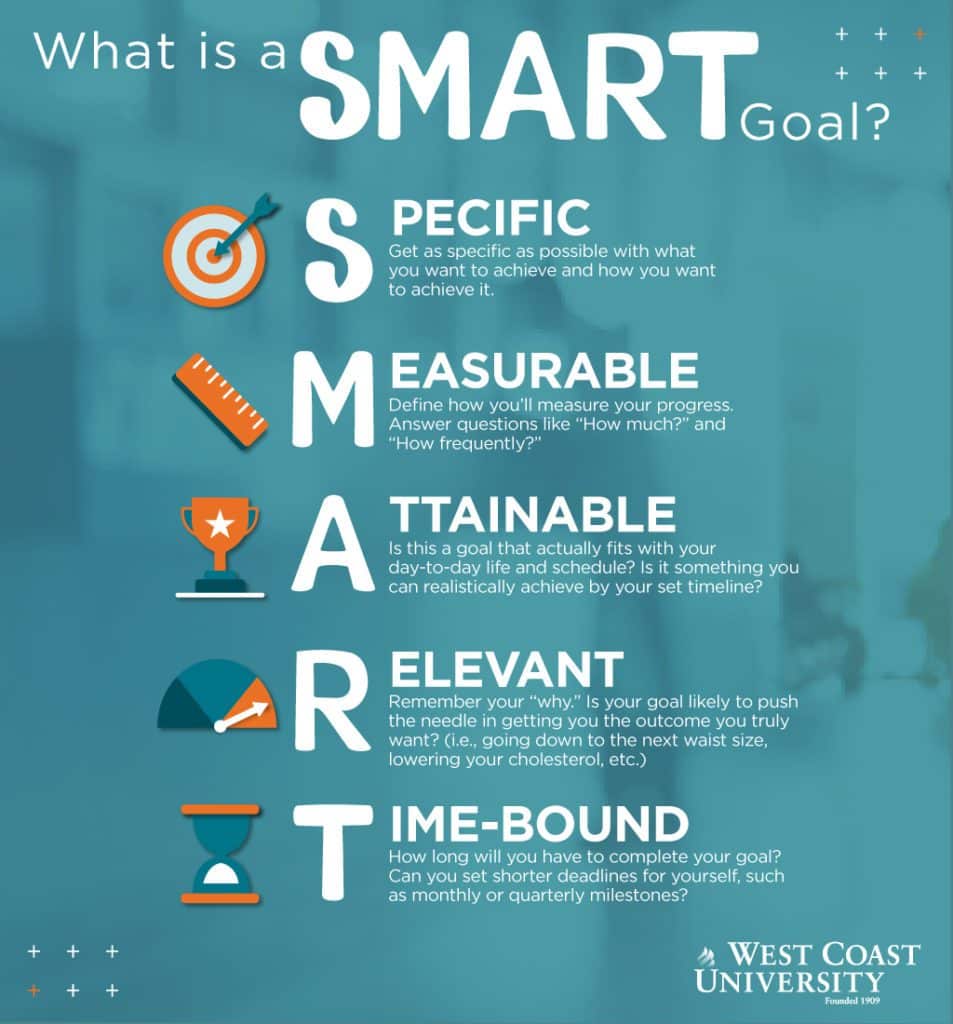Get ready. Get set. Go. Now, keep going.
We at West Coast University are officially declaring 2023 The Year of Yes. We’re heading into the new year in the affirmative, the positive, the decisive. Aspiring healthcare professionals, administrators, and business professionals, your future is calling! Don’t leave it hanging. This is your year to answer: “YES.”
Yes to professional achievement.
Yes to personal growth.
Yes to success and happiness.
But making big things happen for your future means setting big goals, and what better time is there to do that than the start of a brand-new year?
As you set your new educational and professional goals for 2023, get to know your two new best friends: positivity and proactive planning.
The first step to a positive outcome is a positive outlook. Why is positivity so essential? Well, the link between positive emotions and success in the classroom and beyond have been quantified in numerous studies. So, it’s proven – it all starts with a winning mindset!
Next, you’ll need to carry out the right steps for follow-through – this way you can increase the likelihood of actually reaching your goals, and you’ll avoid running into another New Year’s resolution that fizzles out halfway through the year.
Your educational and career goals are too important, so don’t let them fall by the wayside! To help you get on the path to success, we provide some helpful information and tips that you can use to make 2023 The Year of Yes for your future.
Let’s start by exploring the impact of positivity…
Positivity Over Negativity: Exercise Your Optimism
Let’s talk behavioral science for a second, and the importance of practicing positivity to achievement. It requires fighting your natural instincts: that little voice in your head that tells you what if I fail? – that’s your “negativity bias.” It’s natural, and it’s there to hinder you. We’re hardwired to run and hide from danger – to be risk-averse.
This is great when there’s a predator nearby. The problem is, in modern society, there usually isn’t a predator nearby, so your mind substitutes other dangers – deadlines, big challenges, new ventures – and creates the same physiological response. Don’t let your negativity bias hinder you from success. Negativity bias will keep you alive, but sometimes you need to hit the override button when your bias is being overprotective.
Positivity takes practice. There is extensive evidence on the effectiveness of mindfulness practices in maintaining focus and determination. There are many ways to build this muscle:
- Meditating
- Visualizing your goal
- Exercising positive self-talk
- Surrounding yourself with supportive family and friends
- Reminding yourself of the positive outcome you’re trying to achieve (your “why”)
If practiced positivity feels forced at first, keep at it. Over time, you’ll be able to achieve greater emotional equilibrium as well as easier access to logic and creativity for learning, retention, and emotional health. In short, the skills you need to take a goal and turn it into a reality. Which brings us to…
Proactive Planning: Setting Up Steps for Follow-Through
So, you’ve decided to say “yes” to a specific goal to improve your life for 2023… but how do you stay in the “yes”?
Many people view the New Year as a clean slate, giving them the liberating feeling that anything is possible… and it is! The only problem is it’s far too common for the excitement of the New Year to fade away a few months in, resulting in unkept resolutions.
Oftentimes, the issue is the approach in which the resolutioner is tackling their goal. By going into your year-long goal with the right strategy in place, you can improve your chances of success, bringing you that much closer to graduation day, the right job, that big promotion, etc.
Here are three tips for making your goals more likely to become reality by the end of the year:
1. Make Your Resolution Approach-Oriented, Not Avoidance-Oriented
One study found that people are more successful at keeping their New Year’s resolutions when they focus on taking a positive action to approach their goal (i.e., eating healthier meals) rather than avoiding a specific action (i.e., skipping dessert five days a week). The study showed that after a year, 58.9% of participants with approach-oriented goals were successful, compared to just 47.1% of participants who selected avoidance-oriented goals.
So, stay in the positive mindframe when creating your goals! Focus on positive actions you can take to reach a specific outcome rather than negative actions you should avoid – because let’s face it… we all tend to lose momentum when we’re told we can’t do something.
2. Make Your Goal Specific and Measurable (SMART Goals)
It’s easy to get sucked into setting big, broad goals like “I want to get promoted.” That’s great, but this leaves room for questions, such as: “What type of promotion?” “By when?” “How will you increase your chances of a promotion, and what should that plan of action look like?” Without a more specific vision of what you’re trying to achieve, you may feel lost and lose steam along the way.
When you set a resolution for the year (whether it be educational, professional, personal, etc.), focus on creating a “SMART” goal.

For a goal as big as getting a promotion, you may want to set smaller and more specific goals for helping you reach the “big goal.” For example, you might increase your chances of getting a promotion by setting a goal of obtaining more professional certifications by the end of the year.
You can turn this into a SMART goal with more details such as the following:
- Obtain three certifications focused on strategic management, project management, and marketing with a deadline of one certification every four months.
The more specific your plan is, the more you can visualize yourself actually completing it, which puts you on the right track for success!
3. Set Milestones and Celebrate the Smaller Wins
Chipping away at a large goal can feel never-ending. That’s why it’s helpful to split up your long-term goal into smaller milestones that you can achieve along the way.
According to an interview with Ayelet Fishbach, social psychologist and author of Get It Done: Surprising Lessons from the Science of Motivation, people tend to be the most motivated at the start of their goal period and toward the end when they’re getting close to the finish line. It’s in the middle where they typically tend to lose momentum.
To get around “the middle problem,” Fishbach suggests splitting longer goal periods into smaller time frames, which provides a fresh-start effect. An example would be setting a monthly savings goal rather than an annual one.
Fishbach also stressed the importance of finding ways to have fun while achieving your goals, as people tend to be more strongly motivated by immediate rewards (enjoyment of the activity) rather than delayed rewards (weight loss, better health, higher-paying job, etc.).
So, set some landmarks for your year-long goals and make sure you stop to enjoy the scenery once you hit your part-way point. Hitting that first, second, or third milestone will likely give you some immediate satisfaction and motivation to keep going for the long haul.
Take the First Step Toward Your Educational Goals
Do you have a long-term goal of advancing your education and paving the way for new career opportunities in the future? If so, you may want to consider enrolling in one of our nursing, business, or healthcare programs at West Coast University.
We have start dates throughout the year, so you have plenty of opportunities in 2023 to begin your educational journey.
Explore our online and campus programs and then reach out to us if you have any questions about how to get started.
2023 is your year to say YES to your education and career growth!
WCU provides career guidance and assistance but cannot guarantee employment. The views and opinions expressed are those of the individuals and do not necessarily reflect the beliefs or position of the school or of any instructor or student.



